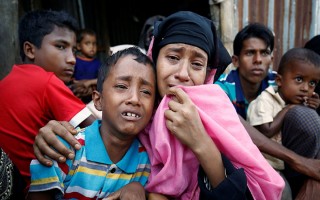Traffickers make money out of Rohingyas’ woes
Humna traffickers are making fortune as Rohingyas fleeing ethnic cleansing in Myanmar continue to enter Bangladesh paying the traffickers Tk 1,000-7,000 for each.
The influx of Rohingya Muslim refugees, which began in mid-October, continued as at least 200 Rohingyas entered Bangladesh on Sunday.
The number of the arrivals reached 20,000 as claimed by Rohingya leaders.
Rohingya refugees, who recently entered the country, told New Age on Sunday that they had to pay money or valuables like ornaments to human traffickers for crossing the river Naf that divided Bangladesh and Myanmar over a stretch of 52km.
‘Those who cannot afford the trip do not stand a chance of entering Bangladesh,’ said Hossain Johar, 27, who along with nine of his family members crossed the river Naf early Sunday.
It cost Johar and his family Tk 35,000 to make the boat trip across the river, he said.
Johar and his family had to wait about two hours for entering Bangladesh along the border as a Border Guard Bangladesh team was patrolling there.
‘The traffickers have a very strong network of operatives who kept informing us about the movement of the BGB patrol team,’ said Johar, who reached makeshift camp at Leda at about 3:00am.
The traffickers must be paid before boarding the boat on Myanmar side and then the boat sails across the river. The boatman unloads the refugees at a point where the chances of a border guard patrol is unlikely in the next few minutes.
Johar also said that the traffickers were from both Bangladesh and Myanmar.
Once disembarked from the boat, the refugees are received by agents sent by the traffickers or by their acquaintances or relatives or family members, who entered Bangladesh earlier, and taken to places scattered across Cox’s Bazar district, Rohingyas and local people said.
Local grocer in Teknaf town Halim Mia said that the traffickers were making huge money out of Rohingya ‘business.’
‘A boatman, who usually earns Tk 500 per day, now earns Tk 20,000-30,000 in 24 hours,’ Halim said.
A dozen Rohingya refugees at Leda and Kutupalang unregistered camps said that each of them had to pay traffickers money ranging from Tk 1,000 to Tk 7,000 for each to enter Bangladesh.
As the Rohingyas had to leave their country all of a sudden after Myanmar military started setting their villages ablaze and killing them following October 9 attack on Mynamar’s border outposts, many of the refugees had the time to collect money staked at their houses.
‘Many women paid traffickers by giving their gold ornaments,’ said Rohingya leader Amir Hossain.
This is not the first time that the presence of the human trafficking syndicate has been exposed to the law enforcers or local people.
According to local journalists, state-sponsored violence on the Ronhigya religious minority in Myanmar has shaped the human trafficking syndicate over decades, particularly since the first refugee influx in 1978.
All the 3-5 lakh unregistered Rohingya refugees currently living in the country have entered from Myanmar with the help from traffickers, they said.
Border guards foiled attempts of about 1,700 Rohingyas to enter Bangladesh in recent months till the beginning of the new influx in October. They resisted another 2,000 Rohingyas from entering the country in November in the wake of the fresh violence against Rohingyas in Myanmar.
Teknaf hit the headlines in international media after it was revealed last year that human traffickers operating from Cox’s Bazar sent several thousand victims to Thailand and Malaysia by boat through the Bay of Bengal and the Andaman sea between 2010 and 2015.
The human traffickers at Teknaf operate in collaboration with traffickers from Myanmar, who sent many Rohingyas to Bangladesh for taking the sea voyage, media reports said.
Rohingyas, considered by many as the world’s most persecuted minority people, are currently living in 18 countries across the world. Many of them are believed to have been victims of human trafficking.
About two weeks ago, police at Teknaf arrested 11 human traffickers for their involvement in bringing Rohingya refugees into the country.
Border guards in November arrested 13 human traffickers and resisted 200 boats from bringing Rohingya refugees into the country.
Teknaf police station officer-in-charge Abdul Majid said, ‘We have prepared a list of 30-35 traffickers…A drive is on to arrest them.’
- See more at: http://www.newagebd.net/article/4151/traffickers-make-money-out-of-rohingyas-woes#sthash.FmqCsPTl.dpuf











